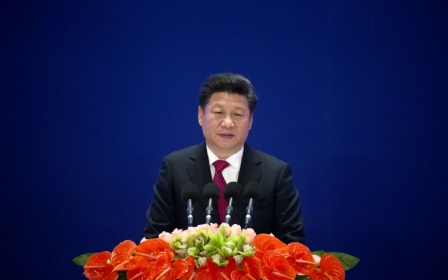China and Gulf states target free trade deal by end of year

China and the Gulf Cooperation Council (GCC) states said on Wednesday they hoped to reach an agreement on creating a free trade zone before the end of the year.
Talks with Beijing on a free trade agreement have already been under way for more than a decade, but in a joint statement issued during Chinese President Xi Jinping's visit to Saudi Arabia the six-state bloc said negotiations would be accelerated.
"China and the GCC have decided to accelerate the pace of negotiations, review the progress made and hold the next round of negotiations in the second half of February 2016," the statement said.
"China and the GCC also commit themselves to work closely to conclude a comprehensive free trade agreement within the year of 2016."
China and the GCC, which is made up of Bahrain, Kuwait, Oman, Qatar, the United Arab Emirates and Saudi Arabia, launched free trade talks in July 2004.
Four years ago, then-Chinese premier Wen Jiabao called on both sides to "show political will to sign the agreement as soon as possible".
Wednesday's joint statement said negotiations had resumed on Sunday, and on Tuesday "substantially concluded in principle the negotiations on trade in goods".
Trade between the Gulf and China, the world's second-largest economy, has been growing.
Two-way trade between China and Saudi Arabia alone reached $69.1 billion in 2014, according to China's official Xinhua news agency.
Plunging global oil prices are forcing economic reforms in the traditionally oil-dependent Gulf economies, as China expands its economic and political ties with the Middle East.
Xi's five-day visit to the Middle East will also take him to Iran, Saudi Arabia's regional rival, and Egypt, a long-standing ally in the region.
China has become increasingly focused on strengthening its presence in the Middle East and established strategic partnership agreements with Iraq and Jordan last year.
Last month China also hosted a visit by Sheikh Mohammed bin Zayed al-Nahyan, the crown prince of the United Arab Emirates, in which the countries signed an agreement to cooperate in space research.
Michal Meidan, an expert on China-Middle East relations at the Chatham House thinktank, told Middle East Eye that one of the main goals of Xi’s visit was to promote his “One Belt, One Road” policy, which aims to create a 21st century Silk Road built on Chinese investment in infrastructure projects stretching across Eurasia to the Middle East, Africa and Europe.
“Xi is one of China’s most well-travelled presidents and he hadn’t been to the Middle East so this is a long overdue trip,” said Meidan.
“It had been postponed on a number of occasions because of regional tensions between Saudi Arabia and Iran.”
Stay informed with MEE's newsletters
Sign up to get the latest alerts, insights and analysis, starting with Turkey Unpacked
Middle East Eye delivers independent and unrivalled coverage and analysis of the Middle East, North Africa and beyond. To learn more about republishing this content and the associated fees, please fill out this form. More about MEE can be found here.




